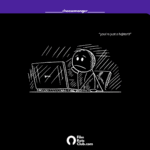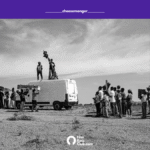by Oluwa Damilare
Eyimofe (This is My Desire) 2021 is a film that captures, asymmetrically, the three stages of life, death and the in-between. These stages are experienced in two chapters by three different characters in one world – Lagos, Nigeria. The film written and directed by Chuko and Arie Esiri begins with a still frame; a cluster of tired junction boxes and ends with a still frame of darkness as credits roll. The significance of this opening and end is symbolic of the existential givens the film presents – of life, the in-between, and death.
Accordingly, the film follows Irvin Yalom’s four existential givens of the human condition: death, meaning, isolation, and freedom. For it is when our hero Mofe [Jude Akuwudike (Beast of No Nation)] loses his sister and nephews living with him that his life takes a detour into isolation and ultimately a long road to freedom. In all of Mofe’s actions, his only sin is to want to leave Nigeria while being clueless to the process of securing a visa and even more oblivious of his purpose in the grand scheme of things. He’s just a weary electrical engineer at a printing press – still employed perhaps because of an ineffective organization, for many Nigerian industries love cheap labour even to their own detriment. They simply don’t care as long as it’s still manageable. Talk about the “patch-patch ideology”
Mofe is a kind of man content if you don’t smile back at him. But a man like him can be unforgiving; a man like him can’t stand being cheated. For people like him, they must battle to secure their rightful place in this world and when they start hoarding their smiles, tapping to the discontent sizzling beneath, then there’s a looming earthquake. Even when he does explode, Mofe withdraws quickly, choosing to implode and we hardly know what he would do next. We do not know Mofe more than this. He’s a quiet man with daddy issues, fleeting through the toughest situations, observing, mostly, even in his own tragedy.
For Arthur Miller, in his 1949 essay Tragedy and the Common Man, tragedy is driven by man’s total compulsion to evaluate himself justly and in the process of doing this, and attaining his dignity, the tragic hero often loses his life. Society destroys him. Mofe defeats Miller’s theatrical endgame of the hero’s destruction as he dusts himself and climbs again, partially forsaking his dream of migrating overseas to start his own precious company in a corner shop in this same tragic city.
“You only run for the border, when you see the whole city running as well…because prison is safer than a city of fire” – Warsan Shire
Tied to the second chapter, the story of Rosa [Temi Ami-Williams] and her pregnant teenage sister Grace (Cynthia Ebijie) exists in what appears to be a lengthier, complex web of events that exposes us to a more vibrant, multicultural life with women at its core. Rosa works as a hairdresser and bartender, two jobs that allow her experience customers of different natures. Rosa is ambitious, stern on her demands, and innocently sly. Her dream to enter Italy with her sister comes with a Mephistophelean price she’s ready to pay. She wants a better life for her sister and she’s willing to use her feminine allure to get what she wants. Miller affirms Rosa a hero when he imagines that “a hero is anybody who is willing to lay down his life in order to secure his sense of personal dignity”. These three characters represent the Nigerian Dream, a pyramid of Nigerians seeking to escape the everyday tragedy. These characters are only victims of society’s flaw. It is not your fault until you allow yourself become a threat to the existence of others.
In an interview with Will Okiche for Sense of Cinema, the Esiri brothers speak about their influences from James Joyce’s Dubliners, Charles Dickens’ Bleak House, CS Lewis A Grief Observed, and George Elliot’s Silas Marner to Hou Hsiaos-hsien’s works of the New Taiwanese cinema, Chungking Express (1994), and Satyajit Ray’s The Apu Trilogy (1955 -1959). I’m particularly interested in their reference of the New Taiwanese Cinema, a movement acclaimed for its realistic portrayals of Taiwanese life. They are led by a non-conventional structure backed by realism amidst innovative narrative techniques. So conventional structures that typically build the drama to a climax are abandoned and the story is progressed at the pace as it would in real life, stripping society to tackle poverty, class struggles and moral conflicts. This is what Eyimofe picks on. The writing and dialogues are worked thoroughly, almost to sound non-existent. The camera is simply witnessing the characters in their playing field, the “emptiness” is a character artistically designed by the filmmakers to establish a romantic affair with tragedy.
“We have a habit of not wanting to assess or critically engage reality.” Chuko Esiri says.
True. The wave of escapist cinema has blinded Nigerian audiences. They have been overfed with so much sugar, unaware that they have been cheated out of enjoying the array of narratives and powerful languages that cinema offers. Many filmmakers are primarily setup for commercial relevance (this is no crime), however, story and technique rot in their prison cells, viewing from a keyhole at their much celebrated box office victories. A review of the film by Hollywood Reporter supports that “with hints of Ozu, Claire Denis and Robert Altman’s Short Cuts, this carefully observed and well-performed drama is a far cry from the typical fodder churned out by the Esiri brothers’ native Nollywood film industry, offering up an indie alternative that’s small in stature but large in scope…”
This “fodder” is the work of filmmakers, producers especially who are rather uninspired by the realities of the society. And even when they attempt stabs at it, is not far from news report. Many critics are often not motivated to engage films because of this dearth. The Esiri Bros, graduates of Screenwriting and Directing Columbia University School of the Arts and the New York University’s Tisch School of the Arts Graduate Program have touched the heart of a few audiences with an outstanding film about migration – on both a literal and figurative level – approached with a sense of technique and style.
To appreciate this film, you must first be a human, a patient one at that. Films like this teach that. In a world where information is faster than you can blink and cultural lifestyles are constantly revamped, humans are losing their altruism, and their opinion of realities is being shuddered by lazy opinions from social media. Films like the slow-burning Eyimofe are needed to help us revisit our human lives, to make better choices when plans fail, to reinstate the necessity for parental care and constitutional provision to increase wages and care for helpless citizens. The moment you sit through Eyimofe, you become a man in Mofe and a woman in Rosa and Grace. You see the divide and the confluences of masculinity and femininity and then you are left, alone, in that darkness as credit rolls to reexamine your ideology. Now, it’s your turn to start again.
Till then, we wait, as more film students abroad migrate home to teach us what true cinema should be or perhaps filmmakers at home are themselves trying to reinvent the idea of cinema and its language.
Honourable Mentions:
Cinematographer – Arseni Khachaturan
Production designer – Taisa Malouf
Music Composer – Akin Adebowale








40 thoughts on “Eyimofe: Romanticizing the Idea of Tragedy”
A beautiful movie through and through ❤
I agree totally that to appreciate this film you must be human and a patient one at that. This is apt.
Where the world slides?
Pingback: generic daily priligy
Pingback: albuterol hfa price
Pingback: hydroxychloroquine how to buy
Pingback: is hydroxychloroquine a steroid
Pingback: malarial treatment hydroxychloroquine dose
Pingback: hydroxychloroquine mexico online
Pingback: keto clarity: your definitive guide to the benefits of a low-carb, high-fat diet
Pingback: thuoc ivermectil 6mg
Hello There. I found your blog using msn. This is an extremely neatly written article.
I’ll make sure to bookmark it and come back to read more of
your useful information. Thanks for the post.
I’ll certainly return. http://herreramedical.org/albuterol
Pingback: priligy from mexico pharmacy
Pingback: stromectol for sars
Pingback: plaquenil for std
Excellent post. I was checking continuously this blog and I
am impressed! Extremely useful information particularly the last part 🙂 I care for such info much.
I was seeking this certain information for a very long time.
Thank you and good luck. https://tadalafili.com/
Pingback: deltasone over the counter walmart
Pingback: dating gay for a transguy
Pingback: stromectol and zyrtec
Pingback: stromectol 6mg capsules price
Pingback: how long is ivermectin effective
Hi, Neat post. There is an issue along with your web site in web explorer, might check
this? IE still is the market leader and a good component of other
folks will pass over your wonderful writing because of this problem. http://harmonyhomesltd.com/Ivermectinum-pharmacology.html
Pingback: ivermectin toxicity in humans
Pingback: stromectol 6mg capsules price
Pingback: ivermectin 12 mg tablets
Pingback: cialis 20mg uk
Pingback: fertility drug clomid
This article is actually a pleasant one it helps new the web visitors,
who are wishing for blogging. http://ciaalis2u.com/
Pingback: cost of ivermectin
Pingback: ivermectin instructions for scabies
Pingback: ivermectina usa
Pingback: viagra best price canada
Pingback: no script viagra
Pingback: prescription medication and flying
Pingback: cialis prescription price australia
Pingback: hydroxychloroquine for sale
Pingback: stromectol sale canada
Pingback: usa viagra over the counter
Pingback: best price generic tadalafil
Pingback: can i buy male viagra over the counter